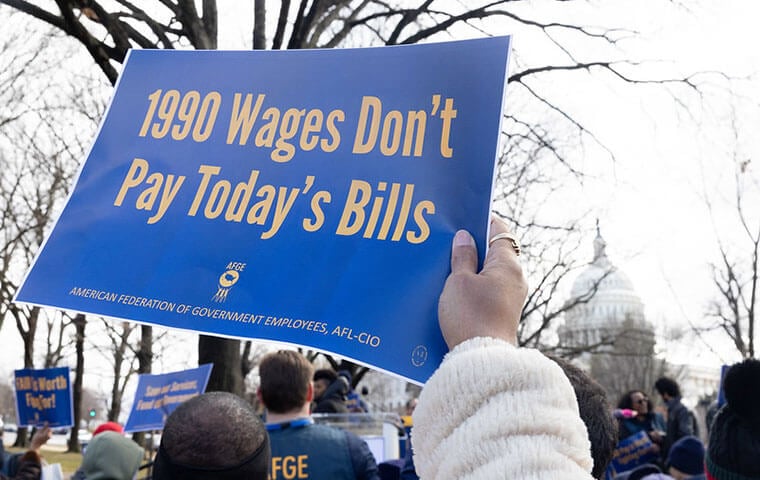 Washington DC union rally during AFGE Legislative Conference February 2024. Image: photoby Keith Mellnick
By: FEDweek Staff
Washington DC union rally during AFGE Legislative Conference February 2024. Image: photoby Keith Mellnick
By: FEDweek StaffCommittee-crafted provisions for the Senate version of a key tax and spending bill would target federal employee unions and grant the White House new authority to reorganize federal agencies.
The union-related provisions reflect changes that many Republicans have long sought, including effectively ending “official time” by requiring unions to reimburse agencies for its value. Official time is on-the-clock time for federal employees who serve in certain union roles to conduct certain types of union-related business; amounts are negotiated between the unions and agencies.
Unions view official time, authorized under federal labor-management law, as a tradeoff for the requirement that they must represent bargaining unit members regardless of whether they pay dues. Republican-sponsored bills over many years to abolish it never were enacted, and sponsors lately have turned instead to discouraging unions from using it by charging them for it.
Unions also would be required to reimburse agencies for their use of onsite office space and other resources, also traditionally negotiated in contracts. “Union representatives can still engage in union activities for free outside of working hours and without using federal resources,” says a summary by the Homeland Security and Governmental Affairs Committee.
Further, unions would have to pay a 10 percent fee to agencies for having union dues withheld from employee pay. That would not affect dues paid in other ways such as through drafts from employee bank accounts.
The agency reorganization language also reflects legislation Republicans sponsored following the Trump administration taking office. It would revive an authority, last used in 1984, under which a President would annually submit a plan “specifying reorganizations of agencies the President finds necessary.”
The President then could then “execute” the reorganization—with no involvement by Congress mentioned in the language—unless it would increase the number of federal agencies or result in higher costs. “Any President should have the ability to clear the waste he or she has identified,” says the committee summary.
Other newly-added provisions in the Senate version of the bill would extend the Pandemic Response Accountability Committee for continued oversight of not only spending related to the pandemic but also for other spending; and rescind funding provided to the USPS under the Biden White House for electric vehicles and infrastructure, and require the USPS to sell anything already purchased and turn the money over to the Treasury.
Shutdown Meter Ticking Up a Bit
Judge Backs Suit against Firings of Probationers, but Won’t Order Reinstatements
Focus Turns to Senate on Effort to Block Trump Order against Unions
TSP Adds Detail to Upcoming Roth Conversion Feature
White House to Issue Rules on RIF, Disciplinary Policy Changes
Hill Dems Question OPM on PSHB Program After IG Slams Readiness
See also,
How Do Age and Years of Service Impact My Federal Retirement
The Best Ages for Federal Employees to Retire
FERS Retirement Guide 2025 – Your Roadmap to Maximizing Federal Retirement Benefits

